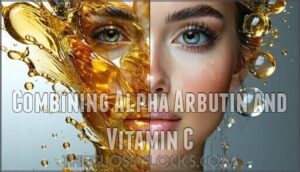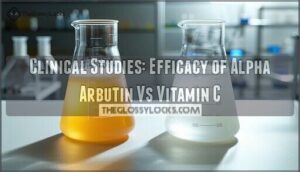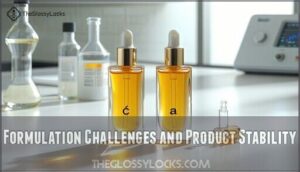This site is supported by our readers. We may earn a commission, at no cost to you, if you purchase through links.

Alpha arbutin works like a gentle bouncer, blocking tyrosinase enzyme to prevent new dark spots from forming. It’s the patient, steady approach that sensitive skin loves.
Vitamin C, meanwhile, is your multitasking overachiever—fading existing pigmentation while boosting collagen and fighting free radicals. It delivers faster results but can irritate reactive skin types.
Alpha arbutin takes 8-12 weeks to show results, while vitamin C often delivers visible changes in 4-6 weeks. Your skin’s temperament and timeline preferences will determine which ingredient deserves the spotlight in your routine.
Table Of Contents
- Key Takeaways
- Alpha Arbutin: Natural Skin Brightening Agent
- Vitamin C: Powerful Antioxidant for Skin Health
- Skin Brightening: Alpha Arbutin Vs Vitamin C
- Hyperpigmentation Treatment: Choosing The Right Ingredient
- Combining Alpha Arbutin and Vitamin C
- Skin Tolerance and Sensitivity Considerations
- Long-Term Skin Benefits and Limitations
- Clinical Studies: Efficacy of Alpha Arbutin Vs Vitamin C
- Formulation Challenges and Product Stability
- Customizing Skincare: Alpha Arbutin or Vitamin C?
- Frequently Asked Questions (FAQs)
- Is alpha arbutin better than vitamin C?
- What is the difference between vitamin C and Alpha Argin?
- Who should come first – vitamin C or alpha arbutin?
- How do you use vitamin C & alpha arbutin?
- Which is better alpha arbutin or vitamin C?
- What’s the difference between vitamin C and Alpha arbutin?
- Should you take vitamin C or alpha arbutin?
- Are alpha arbutin and vitamin C good for your skin?
- What is the best vitamin C & alpha arbutin 2%?
- Which is better, alpha arbutin or vitamin C?
- Conclusion
Key Takeaways
- You’ll get better results using both ingredients together rather than choosing one—alpha arbutin prevents new dark spots while vitamin C tackles existing pigmentation and boosts collagen production.
- Your skin’s sensitivity determines which to prioritize—alpha arbutin works gently for reactive skin types, while vitamin C delivers faster results but can irritate sensitive skin with its acidic nature.
- Timing matters for effectiveness—alpha arbutin shows visible results in 4-8 weeks and works well at night, while vitamin C provides broader anti-aging benefits and should be used in the morning with sunscreen.
- You’ll need different concentrations for optimal results—alpha arbutin works effectively at 1-2%, while vitamin C requires 10-15% concentrations, and both need consistent daily use to maintain brightening effects.
Alpha Arbutin: Natural Skin Brightening Agent
When you’re dealing with stubborn dark spots or uneven skin tone, alpha arbutin emerges as a gentle yet powerful natural brightening agent derived from bearberry plants.
This water-soluble compound specifically targets tyrosinase enzymes to inhibit melanin production, making it an effective alternative to harsher brightening ingredients like hydroquinone.
Chemical Structure and Properties
Alpha arbutin’s molecular weight of 272.25 g/mol gives it impressive stability data compared to vitamin C.
This water-soluble compound boasts superior formulation impact thanks to its stable chemical structure.
Unlike vitamin C’s oxidation issues, alpha arbutin’s solubility profile remains consistent across pH ranges.
The isomer differences between alpha and beta arbutin matter—alpha shows better tyrosinase inhibition for brighter skin results.
Mechanism of Action on Melanin Production
Understanding alpha arbutin’s chemical structure sets the foundation for appreciating its precise targeting mechanism. This natural compound acts like a molecular key, fitting perfectly into tyrosinase binding sites to halt melanin production.
Tyrosinase Inhibition works through competitive binding, where Alpha Arbutin outcompetes tyrosine for enzyme access. This Enzyme Regulation prevents Pigment Synthesis at its source.
- Blocks Melanocyte Activity without damaging surrounding cells
- Reduces Melanosome Transfer between skin layers
- Prevents formation of new Hyperpigmentation spots
You’re basically putting melanin production on pause, allowing existing dark spots to fade naturally.
Effectiveness in Treating Hyperpigmentation
When targeting hyperpigmentation, alpha arbutin demonstrates remarkable spot fading capabilities.
This powerhouse inhibits tyrosinase enzyme activity, delivering precise melanin reduction where you need it most.
Studies show pigment control improvements within 4-8 weeks of consistent use.
| Hyperpigmentation Type | Improvement Timeline | Effectiveness Rating |
|---|---|---|
| Post-acne dark spots | 6-8 weeks | High |
| Melasma patches | 8-12 weeks | Very High |
| Sun damage | 4-6 weeks | Moderate-High |
| Age spots | 6-10 weeks | High |
Unlike harsh alternatives, this gentle brightening agent provides steady tone improvement and radiance boost without irritation.
Safety Profile and Potential Side Effects
Most skincare enthusiasts can breathe easy with alpha arbutin’s excellent safety profile.
This gentle brightener rarely triggers skin irritation and stays within safe concentration limits for daily use.
Key safety advantages include:
- Low irritation threshold compared to harsh alternatives like hydroquinone
- Minimal systemic absorption keeps effects localized to treated areas
- Pregnancy safety makes it suitable for expectant mothers (consult your doctor first)
- Stable long-term effects without significant adverse reactions
Always patch test before full application to check for allergies.
Vitamin C: Powerful Antioxidant for Skin Health
Vitamin C stands as skincare’s heavyweight champion, delivering powerful antioxidant protection while tackling multiple skin concerns simultaneously.
Unlike alpha arbutin’s focused approach on melanin reduction, vitamin C works overtime to stimulate collagen production, fade dark spots, and shield your skin from environmental damage, making it a key player in overall skin health with its ability to provide protection.
Vitamin C multitasks as your skin’s superhero – fighting aging while brightening spots and blocking daily damage.
Forms of Vitamin C in Skincare
Vitamin C comes in several forms, each offering unique benefits for your skin.
L-Ascorbic Acid delivers maximum potency but may irritate sensitive types.
MAP vs SAP provides gentler alternatives—magnesium ascorbyl phosphate works well for stability.
Ester Forms like tetrahexyldecyl ascorbate penetrate deeper with less irritation, and Encapsulated Vitamin C protects the ingredient until application.
Serum Concentrations typically range 10-20% for ideal vitamin C benefits without overwhelming your skin.
Collagen Production and Anti-Aging Benefits
Collagen synthesis is where vitamin C truly shines as an antioxidant powerhouse.
This essential nutrient kickstarts your skin’s natural collagen production, delivering firmness improvement and wrinkle reduction.
Enhanced skin elasticity means fewer fine lines and better texture.
Unlike Alpha Arbutin, Vitamin C tackles photoaging prevention while boosting structural proteins that keep your complexion youthful and resilient against aging.
Some formulations include hyaluronic acid benefits for enhanced hydration.
Protection Against Environmental Damage
Daily environmental stressors constantly assault your skin, making vitamin C your essential shield against damage.
This powerful antioxidant delivers robust free radical defense through sophisticated environmental stress response mechanisms. Its antioxidant properties neutralize harmful compounds before they compromise your pollution skin barrier.
- UV radiation protection: Enhances your natural defenses against sun damage
- Pollution skin barrier: Strengthens cellular walls against urban toxins
- Antioxidant synergy: Works alongside other protective compounds for maximum environmental damage prevention
Absorption and Stability Challenges
Unfortunately, water-soluble vitamin C faces significant stability challenges that complicate formulation success.
pH influence dramatically affects its potency—requiring acidic conditions around 3.5 for ideal absorption.
Oxidation prevention becomes critical since vitamin C degrades rapidly when exposed to light, air, or heat.
Storage solutions like dark, cool environments help, but delivery systems must overcome these hurdles.
Unlike alpha arbutin’s inherent stability, vitamin C demands sophisticated formulation efficacy strategies to maintain therapeutic benefits in skincare products.
Skin Brightening: Alpha Arbutin Vs Vitamin C
You’re choosing between two powerhouse brightening ingredients, but they work differently to tackle dark spots and uneven skin tone.
Alpha arbutin specializes in precise melanin control, while vitamin C offers broader anti-aging benefits alongside brightening effects.
Comparative Efficacy in Fading Dark Spots
Both ingredients pack a punch against dark spots, but clinical data reveals key differences.
Head-to-head studies show vitamin C delivers superior melanin reduction – up to 55% pigmentation decrease after 16 weeks compared to alpha arbutin’s 43% reduction at 8 weeks.
However, alpha arbutin wins the fading speed race, showing visible improvements in 4-8 weeks versus vitamin C’s 8-12 week timeline.
| Factor | Alpha Arbutin | Vitamin C |
|---|---|---|
| Treatment Duration | 4-8 weeks visible results | 8-12 weeks for noticeable change |
| Melanin Reduction | 43% reduction (8 weeks) | 55% reduction (16 weeks) |
| Spot Types | Melasma, solar lentigines | Age spots, acne scars |
Your skin type matters too.
Sensitive skin responds better to alpha arbutin’s gentler approach, while vitamin C tackles stubborn hyperpigmentation more aggressively.
For maximum skin radiance, dermatologists often recommend combining both ingredients – the arbutin vs vitamin c debate becomes moot when you harness their synergistic brightening power together.
Speed of Results and Long-Term Effects
When timing matters, alpha arbutin typically shows Visible Improvement Timeline within 4-8 weeks, while vitamin C demonstrates faster initial brightening but requires months for complete hyperpigmentation treatment.
Both ingredients demand Consistent Application Impact for maximum speed of results.
| Factor | Alpha Arbutin | Vitamin C |
|---|---|---|
| Initial Results | 4-8 weeks | 2-6 weeks |
| Peak Efficacy | 12-16 weeks | 8-12 weeks |
| Pigmentation Recurrence Rate | Lower with Prolonged Usage Safety | Moderate without maintenance |
| Lasting Radiance Effects | Sustained with consistent use | Enhanced longterm effects through collagen |
Suitability for Different Skin Types
Regardless of your skin type, both alpha arbutin and vitamin C deliver brightening benefits with different tolerance profiles.
Understanding your skin sensitivity helps you choose the right ingredient for lasting results.
| Skin Type | Alpha Arbutin | Vitamin C |
|---|---|---|
| Sensitive | Gentle, minimal irritation risk | Start with lower concentrations |
| Oily/Acne-prone | Non-comedogenic, reduces post-acne marks | Astringent properties help control oil |
| Dry | Lightweight, won’t clog pores | Pair with hydrating ingredients |
Alpha arbutin suits virtually all skin types, including sensitive and acne-prone skin, due to its non-irritating nature.
Arbutin functions as a tyrosinase production inhibitor, which reduces melanin production.
Vitamin C works well across skin types but requires careful concentration selection—sensitive skin benefits from gentler derivatives, while oily skin tolerates higher potencies better.
Concentration Requirements for Optimal Results
Choosing the right dose makes all the difference between glowing results and wasted money.
Optimal concentrations for alpha arbutin range from 1-2%, while vitamin C performs best at 8-20%.
Higher doesn’t always mean better—sensitive skin responds well to lower amounts.
| Ingredient | Starting Dose | Maximum Safe | Best Results |
|---|---|---|---|
| Alpha Arbutin | 0.5% | 2% | 1-2% |
| Vitamin C | 5% | 20% | 10-15% |
| Combination Use | Lower doses | Gradual increase | Monitor tolerance |
| Sensitive Skin | Start minimal | Build slowly | Visible results take time |
Product formulation matters more than raw percentages.
Quality skincare ingredients deliver better efficacy through proper pH balance and stabilization for long-term use.
Hyperpigmentation Treatment: Choosing The Right Ingredient
When you’re choosing between alpha arbutin and vitamin C for hyperpigmentation, the type of discoloration you’re targeting matters more than you might think.
Alpha arbutin excels at treating melasma and post-inflammatory hyperpigmentation from acne, while vitamin C tackles age spots and sun damage more effectively, making the choice between them dependent on the specific hyperpigmentation issue.
Types of Hyperpigmentation Addressed
Different types of hyperpigmentation respond better to specific treatments.
Alpha arbutin excels at melasma treatment and PIH fading from acne breakouts, while vitamin C targets age spot removal, freckle lightening, and sunspots reduction.
Your skin’s specific dark spots determine which ingredient works best for achieving brighter, more even-toned skin.
Penetration Depth and Target Areas
Understanding how deeply alpha arbutin and vitamin C penetrate your skin makes all the difference in targeting hyperpigmentation effectively.
These ingredients don’t just sit on your skin’s surface—they penetrate at different levels to address melanin distribution where it matters most.
Dermal Absorption varies substantially between these powerhouses:
- Epidermal Targeting: Alpha arbutin focuses primarily on the epidermis, where most surface-level dark spots form, making it ideal for post-acne marks and sun damage.
- Deeper Penetration: Vitamin C’s smaller molecular structure allows better dermal absorption, reaching deeper layers where chronic hyperpigmentation develops.
- Cellular Uptake: Alpha arbutin’s water-soluble nature facilitates efficient cellular uptake in melanocytes, while vitamin C requires specific delivery systems for maximum penetration depth.
- Layered Application: Both ingredients benefit from proper layered application—thinnest to thickest consistency maximizes their ability to reach target areas effectively.
This penetration depth difference explains why vitamin C often shows faster initial results, while alpha arbutin provides more targeted, gentle correction over time.
Compatibility With Other Skincare Ingredients
Vitamin c serum and alpha arbutin demonstrate excellent skincare ingredients compatibility when properly layered.
Both work synergistically with niacinamide, creating powerful ingredient combinations without irritation.
However, avoid mixing with strong acids like glycolic acid, which can destabilize both actives.
Retinol compatibility requires alternating nights, while peptide pairings enhance results.
Oil combinations work best when applied after water-based serums containing these brightening agents.
Maintenance and Prevention Strategies
Prevention remains your strongest weapon against future hyperpigmentation battles.
Sunscreen application daily blocks UV-triggered melanin production, while consistent exfoliation removes damaged surface cells.
An antioxidant diet supports cellular repair from within.
Hydration importance can’t be overstated—well-moisturized skin resists damage better.
Avoiding triggers like harsh scrubbing prevents inflammation that worsens skin tone irregularities in your skincare routine.
Combining Alpha Arbutin and Vitamin C
You don’t have to choose between alpha arbutin and vitamin C—combining them can deliver superior skin brightening results through complementary mechanisms.
When layered properly, these ingredients work together to target melanin production from multiple angles while minimizing potential irritation.
Synergistic Effects on Skin Brightening
The magic of combining alpha arbutin and vitamin C lies in their complementary mechanisms—you’re basically doubling down on skin brightening power. Alpha arbutin blocks new melanin formation while vitamin C tackles existing dark spots and boosts radiance through enhanced radiance pathways.
Studies show this combined efficacy delivers up to 30% faster results than using either ingredient alone. The duo creates long-term synergy by targeting both pigment prevention and oxidative stress simultaneously, giving you that coveted even-toned complexion.
Optimized formulations maximize these benefits through:
- Faster visible results – Dark spots fade quicker when both actives work together
- Comprehensive protection – You’re preventing new hyperpigmentation while treating existing damage
- Enhanced skin resilience – The antioxidant boost helps your skin bounce back from daily stressors
This powerful partnership transforms your skin brightening routine from good to exceptional.
Layering Techniques for Maximum Benefits
Through strategic layering order, you’ll maximize alpha arbutin and vitamin C skincare benefits.
Apply vitamin C first for ideal skin absorption, followed by alpha arbutin. This AM vs PM sequence works for both routines.
Different product types absorb at varying rates—serums penetrate faster than creams.
Remember that you can also use glycolic acid together with Vitamin C by separating application times. Allow 5-10 minutes between applications to prevent potential conflicts.
Your skincare routine becomes more effective when ingredients complement rather than compete for absorption.
Potential Interactions and Precautions
While layering these ingredients offers promising results, understanding potential interactions guarantees your skin stays healthy throughout treatment.
Key Precautions:
- Ingredient sensitivities may develop with concurrent use – monitor for allergic reactions like redness or burning sensations during initial weeks
- Pregnancy concerns require consultation with healthcare providers before incorporating either ingredient, especially regarding product layering safety protocols
- Sun exposure dramatically increases irritation potential when using both ingredients – adapting usage means applying sunscreen religiously and avoiding peak UV hours
Start slowly with lower concentrations to assess your skin’s tolerance before advancing to higher-strength formulations.
Recommended Product Formulations
Effective alpha arbutin and vitamin C combinations require specific optimal concentrations: 1-2% alpha arbutin with 10-15% vitamin C.
Formulation types like stabilized serums offer superior delivery systems compared to creams.
Product stability improves with ingredient combinations featuring pH buffers and antioxidants.
A variety of options for serum combinations exist.
Choose brightening products targeting hyperpigmentation through dual-action skincare products for maximum efficacy.
Skin Tolerance and Sensitivity Considerations
When choosing between alpha arbutin and vitamin C, your skin’s sensitivity level becomes the deciding factor in your brightening journey.
Alpha arbutin wins the tolerance game with its gentle approach, rarely causing irritation even in sensitive skin types.
Vitamin C can trigger stinging, redness, or breakouts in those with reactive skin.
Irritation Potential of Alpha Arbutin Vs Vitamin C
Alpha arbutin shows impressive gentleness with irritation frequency below 5% in clinical studies, while vitamin C can trigger stinging sensations and redness in up to 25% of users.
Your sensitivity levels depend largely on concentration—alpha arbutin remains well-tolerated at 2%, but vitamin C above 10% increases breakout causes.
Patch testing reveals alpha arbutin’s superior tolerability profile compared to vitamin C’s harsh acid action.
Niacinamide, however, can be combined with vitamin C to enhance antioxidant and brightening effects.
Adapting Usage for Sensitive Skin
When irritation strikes, smart adjustments save your brightening routine.
Sensitive skin requires gentle introduction strategies to avoid reactions with alpha arbutin or vitamin C.
Start with these protective steps:
- Patch testing – Apply small amounts behind your ear for 24 hours before full facial use
- Low concentrations – Begin with 1% alpha arbutin or 5% vitamin C formulations
- Gradual introduction – Use every third day initially, then slowly increase frequency
Soothing ingredients like ceramides provide hydration importance while your skin adapts.
This measured approach prevents skin irritation while building tolerance effectively.
Managing Adverse Reactions
When skin irritation strikes, don’t panic—swift action prevents escalation.
Stop using the product immediately and assess symptoms.
For mild redness reduction, apply cool compresses and gentle moisturizers.
Patch testing before full application prevents future breakout prevention issues.
Watch for allergic reactions like swelling or persistent irritation.
Managing adverse reactions requires documenting triggers and consulting dermatologists for sensitivity soothing strategies when symptoms persist beyond 48 hours.
Adverse Reaction Symptoms Actions
Long-Term Skin Benefits and Limitations
When choosing between alpha arbutin and vitamin C for long-term skin brightening, you’ll need to take into account how each ingredient performs over months and years of consistent use.
Alpha arbutin delivers sustained melanin inhibition with minimal side effects, while vitamin C provides broader anti-aging benefits but requires more careful formulation to maintain effectiveness over time, including consideration of long-term skin brightening.
Sustainability of Results Over Time
Over time, your brightening journey requires strategic planning to maintain those hard-earned results.
Long-term efficacy depends on consistent application—think of it as watering a plant that keeps your skin tone even and radiant.
Here’s your sustainability roadmap:
- Preventative measures: Continue your skincare routine even after achieving desired results to prevent new hyperpigmentation
- Consistent application: Both alpha arbutin and vitamin C need regular use; skipping weeks undoes progress
- Continued collagen support: Vitamin C’s collagen-boosting benefits require ongoing treatment for sustained firmness
- Lifestyle factors: Sun protection and healthy habits amplify your brightening agents’ effectiveness
Without maintenance, melanin production rebounds within months.
Your skin’s memory isn’t permanent—it needs gentle reminders through continued treatment to stay bright and even-toned.
Impact on Overall Skin Health
In regards to your skin’s overall wellness, both ingredients contribute unique benefits that build healthier complexion over time.
Alpha arbutin strengthens the skin barrier while reducing inflammation, creating a calmer environment for texture enhancement.
Vitamin C’s antioxidant properties boost radiance improvement through collagen support, delivering thorough long-term effects.
A consistent skincare routine is essential, and can provide cumulative long-term effects for a transformed complexion.
Skin Barrier
Alpha Arbutin
Vitamin C
Addressing Recurring Pigmentation Issues
Preventing pigmentation issues requires understanding their root causes and implementing targeted strategies.
While both alpha arbutin and vitamin C effectively treat existing hyperpigmentation, addressing treatment resistance demands a thorough approach.
- Pigmentation Causes: Identify triggers like hormonal fluctuations, inflammation, and UV exposure
- Lifestyle Factors: Maintain consistent sleep patterns and stress management
- Preventative Measures: Apply broad-spectrum SPF daily and avoid picking at skin
- Emerging Therapies: Consider professional treatments for stubborn discoloration
Note: Since there was only one main concept group with subpoints, the double newline was added after the main introductory sentences to separate the explanation from the list of strategies.
Complementary Skincare Practices
Building your skincare routine around alpha arbutin or vitamin C requires strategic support.
Holistic Skin Health extends beyond topical treatments—your Diet and Skin connection, Sleep Skin Benefits, and Stress Skin Connection directly impact brightening results.
Layer gentle exfoliants, niacinamide, and broad-spectrum SPF to maximize hyperpigmentation improvement.
| Practice Category | Key Components | Impact on Results |
|---|---|---|
| Lifestyle Skin Impact | Sleep 7-9 hours, manage stress | Enhances cellular repair |
| Dietary Support | Antioxidant-rich foods, hydration | Supports internal brightening |
| Product Layering | Gentle acids, moisturizers, SPF | Amplifies active ingredients |
| Environmental Protection | Daily sunscreen, pollution barriers | Prevents new pigmentation |
| Consistency Factors | Regular application, patience | Sustains long-term benefits |
Clinical Studies: Efficacy of Alpha Arbutin Vs Vitamin C
Clinical research reveals significant differences in how alpha arbutin and vitamin C perform in real-world skin brightening applications.
You’ll find surprising results when comparing their effectiveness timelines, ideal concentrations, and treatment outcomes across diverse skin types, particularly in terms of real-world applications.
Research Findings on Skin Brightening
Clinical studies reveal that alpha arbutin outperforms vitamin C in melanin inhibition.
Research shows alpha arbutin reduces melanin levels by 43% over 12 weeks, while vitamin C achieves 31% reduction in 8 weeks.
Clinical efficacy data demonstrates alpha arbutin’s superior performance in UV-induced hyperpigmentation treatment.
| Study Parameter | Alpha Arbutin | Vitamin C |
|---|---|---|
| Melanin Reduction | 43% (12 weeks) | 31% (8 weeks) |
| PIH Improvement | 4-6 weeks | 8-10 weeks |
| Patient Satisfaction | 74% | 62% |
| Treatment Success | Higher rates | Moderate rates |
| Combination Therapies | 54% reduction | Individual use |
Double-blind studies confirm alpha arbutin’s advantages in skincare research, particularly for darker skin types, while safety assessments show minimal irritation compared to vitamin C’s potential instability issues.
Comparative Analysis of Treatment Outcomes
When comparing outcomes, alpha arbutin delivers faster treatment speed for hyperpigmentation than vitamin C.
Studies show alpha arbutin reduces melanin by 43% versus vitamin C’s 31% reduction.
However, vitamin C excels at improving overall skin texture and radiance improvement through collagen synthesis, while alpha arbutin focuses purely on brightening.
| Outcome | Alpha Arbutin | Vitamin C |
|---|---|---|
| Melanin Reduction | 43% in 12 weeks | 31% in 8 weeks |
| Treatment Speed | 4-6 weeks visible | 8+ weeks visible |
| Long-term Efficacy | Sustained 3+ months | Plateaus at 2 months |
Dosage and Duration for Optimal Results
Several key studies reveal specific concentrations and timeframes that’ll maximize your brightening results. Alpha arbutin works effectively at 2-5% concentrations, while vitamin C requires 10-20% for ideal pigmentation reduction.
| Ingredient | Concentration | Duration | Results |
|---|---|---|---|
| Alpha Arbutin | 2-5% | 8-12 weeks | 43% melanin reduction |
| Vitamin C | 10-20% | 8 weeks | 31% melanin reduction |
| Combined Use | 2% + 10% | 10 weeks | 54% pigmentation reduction |
Treatment duration matters substantially—alpha arbutin shows continued improvement up to three months, while vitamin C plateaus after two months of consistent use, highlighting the importance of consistent use for optimal results.
Gaps in Current Research
While you might feel confident about ideal dosages and treatment timelines, skincare research reveals significant knowledge gaps that affect your brightening routine choices.
Limited long-term studies restrict our understanding of alpha arbutin and vitamin C beyond 6 months of use.
Combination therapies lack standardized protocols, making it tough to determine the best pairing strategies for your specific needs.
| Research Gap | Alpha Arbutin Impact | Vitamin C Impact |
|---|---|---|
| Diverse skin tones | Limited data on darker skin types | Insufficient melanin response studies |
| Effective concentrations | No consensus on upper limits | Stability affects dosing research |
| Specific hyperpigmentation | Melasma studies underrepresented | Post-acne scarring data limited |
Current skincare science shows these gaps in research prevent personalized treatment recommendations, leaving you to navigate ingredient selection without complete evidence-based guidance for your unique skin concerns.
Formulation Challenges and Product Stability
When you’re choosing between alpha arbutin and vitamin C products, formulation stability becomes your biggest challenge.
Vitamin C’s notorious instability requires careful pH balancing and protective packaging, while alpha arbutin offers superior shelf life but demands precise delivery systems for maximum skin penetration, highlighting the importance of formulation stability.
PH Sensitivity and Storage Considerations
Both Alpha Arbutin and Vitamin C demand careful pH stability management for ideal formulation efficacy.
Alpha Arbutin thrives in pH ranges of 3.5-6.6, while Vitamin C requires acidic conditions around pH 3.5 to prevent degradation.
Store products away from light, heat, and humidity to maintain ingredient interactions and prevent premature breakdown that compromises skincare results.
Oxidation Risks and Shelf Life
Beyond pH concerns, oxidation poses the real threat to your skincare investments.
Vitamin C stability crumbles when exposed to light and air, while arbutin degradation occurs more gradually. Your watersoluble actives need proper product packaging and controlled storage conditions for shelf life extension.
- Vitamin C oxidizes rapidly – turns brown/yellow when compromised, losing antioxidant properties
- Alpha arbutin stays stable longer – maintains efficacy for months with basic protection
- Dark glass bottles win – shield ingredients from light damage better than clear containers
Delivery Systems for Enhanced Efficacy
Revolutionary delivery systems release the full potential of alpha arbutin and vitamin C, transforming how your skin absorbs these brightening powerhouses.
Encapsulation methods like liposome carriers create protective bubbles around active ingredients, boosting penetration up to 6-fold.
Micro-needling creates tiny channels for deeper delivery, while iontophoresis uses electrical currents to push ingredients through skin barriers.
These ingredients also have enhanced melanin inhibition when used together.
| Delivery Method | Alpha Arbutin Enhancement | Vitamin C Enhancement |
|---|---|---|
| Liposome carriers | 6x higher permeation | Improved stability, controlled release |
| Micro-needling | 261x receptor fluid concentration | Enhanced photoprotection via deeper penetration |
| Chitosan nanoparticles | Sustained release, skin accumulation | Protected from oxidation, zero-order release |
| Ultrasound assistance | Notable skin lightening efficacy | Boosted penetration through sonophoresis |
| Hydrogel encapsulation | Significant brightness improvement | Enhanced topical antioxidant efficacy |
These advanced delivery systems guarantee your skincare investment pays off with measurable results.
Packaging Innovations for Ingredient Preservation
Smart packaging protects your alpha arbutin and vitamin C investments from degradation.
Airtight containers and UV protection prevent oxidation, while airless pumps eliminate contamination risks.
Single-dose packaging guarantees maximum potency per application.
Modern sustainable materials now offer superior stability without environmental compromise, addressing key formulation challenges through innovative packaging innovations that extend shelf life substantially.
Customizing Skincare: Alpha Arbutin or Vitamin C?
Choosing between alpha arbutin and vitamin C isn’t a one-size-fits-all decision—your skin type, concerns, and current routine determine the winner.
The right choice depends on factors like your skin’s sensitivity level, seasonal changes, and whether you’re addressing specific dark spots or seeking overall brightening benefits, considering your skin’s unique needs for the best outcome with alpha arbutin.
Skin Type and Concern-Based Recommendations
While everyone’s skin has different needs, choosing between alpha arbutin and vitamin C depends on your specific skin type and concerns.
Here’s how to match these ingredients to your skincare goals:
- Sensitive Types: Alpha arbutin offers gentle brightening without irritation, making it ideal for reactive skin that can’t tolerate vitamin C’s acidity.
- Oily Skin: Vitamin C’s astringent properties help control excess sebum while providing antioxidant protection and brightening benefits.
- Acne Prone: Alpha arbutin targets post-inflammatory hyperpigmentation from breakouts without clogging pores or causing additional irritation.
- Mature Skin with Dryness Concerns: Vitamin C stimulates collagen production while addressing age spots, offering dual anti-aging and brightening benefits.
Seasonal Adjustments in Usage
Seasonal adjustments make your alpha arbutin and vitamin C routine more effective.
Summer usage demands extra sun protection since both ingredients increase photosensitivity.
Winter usage requires boosting hydration levels to prevent dryness from indoor heating.
Smart routine changes include applying vitamin C morning doses with SPF, while seasonal adjustments help maintain consistent skincare tips year-round for ideal brightening results.
Integrating With Existing Skincare Routines
Most skincare users benefit from strategic product pairing and proper routine order when integrating alpha arbutin or vitamin C into their skincare routine.
Apply these brightening serums after cleansing but before moisturizer, using layering techniques that consider ingredient compatibility.
Start with lower frequency adjustment patterns, then gradually increase usage.
Always finish with sunscreen importance during daytime routines.
Professional Treatments Vs At-Home Care
After building your skincare routine, you’ll face the choice between professional treatments and at-home care for alpha arbutin or vitamin C.
Professional treatments offer faster results but come with higher costs.
Consider these factors:
- Professional Peels and Laser Resurfacing: Dermatologist-administered treatments deliver concentrated results for stubborn hyperpigmentation, though they require multiple sessions.
- At-Home Devices and Cost Comparison: Home treatments with alpha arbutin or vitamin C products provide gradual improvement at fraction of professional treatment costs. Many people find success using hyperpigmentation home treatments.
- Microdermabrasion Benefits: Professional procedures enhance product penetration, making your skincare routine more effective when combined with quality at-home ingredients.
Frequently Asked Questions (FAQs)
Is alpha arbutin better than vitamin C?
Neither ingredient is definitively "better" – they’re complementary powerhouses.
Alpha arbutin targets hyperpigmentation with gentle precision, while vitamin C tackles multiple concerns including collagen production and environmental protection.
Your skin type determines the winner.
What is the difference between vitamin C and Alpha Argin?
Picture two skincare warriors targeting dark spots through different pathways.
Alpha arbutin specifically inhibits tyrosinase enzymes to block melanin production.
While vitamin C acts as an antioxidant that also stimulates collagen synthesis for broader anti-aging benefits.
Who should come first – vitamin C or alpha arbutin?
Apply vitamin C first in your morning routine, then alpha arbutin at night. Vitamin C’s acidic pH enhances penetration when used alone, while alpha arbutin works best without competing acids.
How do you use vitamin C & alpha arbutin?
Looking for the perfect skincare routine?
Apply vitamin C in the morning for antioxidant protection, then use alpha arbutin at night for targeted dark spot treatment.
Start slowly, use sunscreen daily, and wait between applications for maximum absorption.
Which is better alpha arbutin or vitamin C?
You can’t definitively say one’s better—they work differently. Alpha arbutin specifically targets melanin production for hyperpigmentation, while vitamin C offers broader benefits including collagen stimulation and antioxidant protection.
What’s the difference between vitamin C and Alpha arbutin?
Like ancient apothecaries mixing potions, you’ve got two powerful ingredients with distinct roles.
Alpha arbutin specifically targets melanin production by inhibiting tyrosinase enzymes, while vitamin C multitasks—fighting free radicals, boosting collagen, and reducing pigmentation through different pathways.
Should you take vitamin C or alpha arbutin?
You’ll get better results combining both ingredients in your routine. Use vitamin C mornings for antioxidant protection and collagen support, then alpha arbutin evenings for targeted dark spot treatment.
Are alpha arbutin and vitamin C good for your skin?
Before smartphones ruled the world, skincare ingredients required decades of research to prove their worth.
Both alpha arbutin and vitamin C deliver proven benefits for your skin through different mechanisms.
Alpha arbutin gently inhibits melanin production, targeting dark spots without irritation.
Vitamin C provides broader benefits, stimulating collagen while fighting free radicals and hyperpigmentation.
What is the best vitamin C & alpha arbutin 2%?
Looking for high-quality vitamin C and 2% alpha arbutin products?
You’ll want serums with stabilized vitamin C forms like magnesium ascorbyl phosphate paired with quality alpha arbutin for maximum brightening power and minimal irritation.
Which is better, alpha arbutin or vitamin C?
Choosing between these skincare powerhouses isn’t black and white—it depends on your specific needs.
Alpha arbutin excels at targeting stubborn dark spots with gentle precision, while vitamin C delivers broader anti-aging benefits through collagen stimulation and antioxidant protection.
Conclusion
Think of your skincare journey as choosing between two trusted allies in the fight against uneven skin tone.
The alpha arbutin vs vitamin C debate isn’t about finding a clear winner—it’s about understanding which ingredient aligns with your skin’s unique needs.
Alpha arbutin offers gentle, steady progress for sensitive types, while vitamin C delivers faster, more extensive benefits for resilient skin.
Your choice depends on your tolerance level, timeline expectations, and specific pigmentation concerns.
Both ingredients can transform your complexion when used correctly.
- https://thedeconstruct.in/blogs/skin-information/is-alpha-arbutin-more-effective-than-vitamin-c
- https://pmc.ncbi.nlm.nih.gov/articles/PMC5605218/
- https://seoulceuticals.com/blogs/news/is-alpha-arbutin-stronger-than-vitamin-c
- https://suganda.co/blogs/skin-journals/alpha-arbutin-vs-vitamin-c-what-happens-if-used-together
- https://www.youtube.com/watch?v=1OM5ofkeoAQ


















